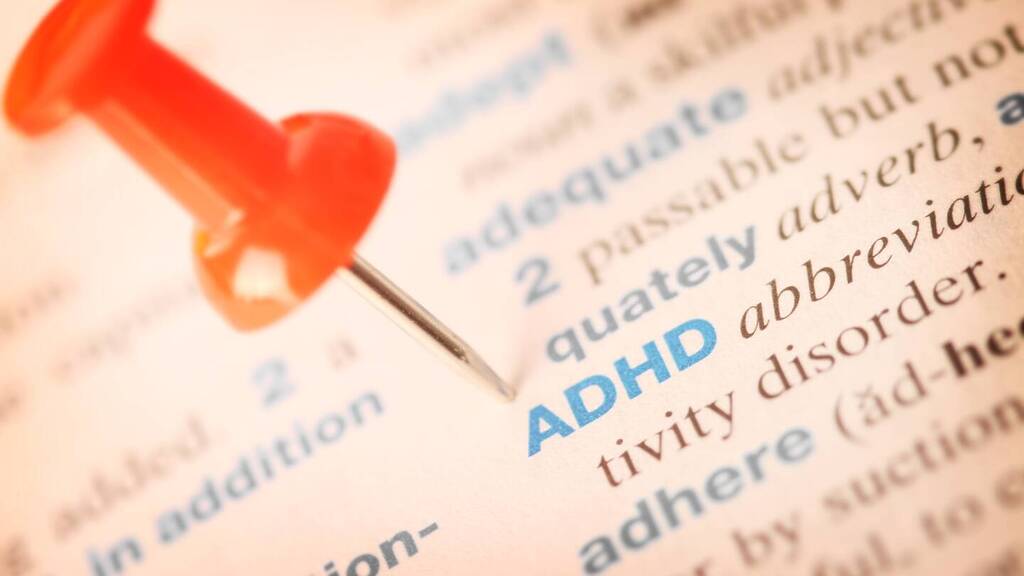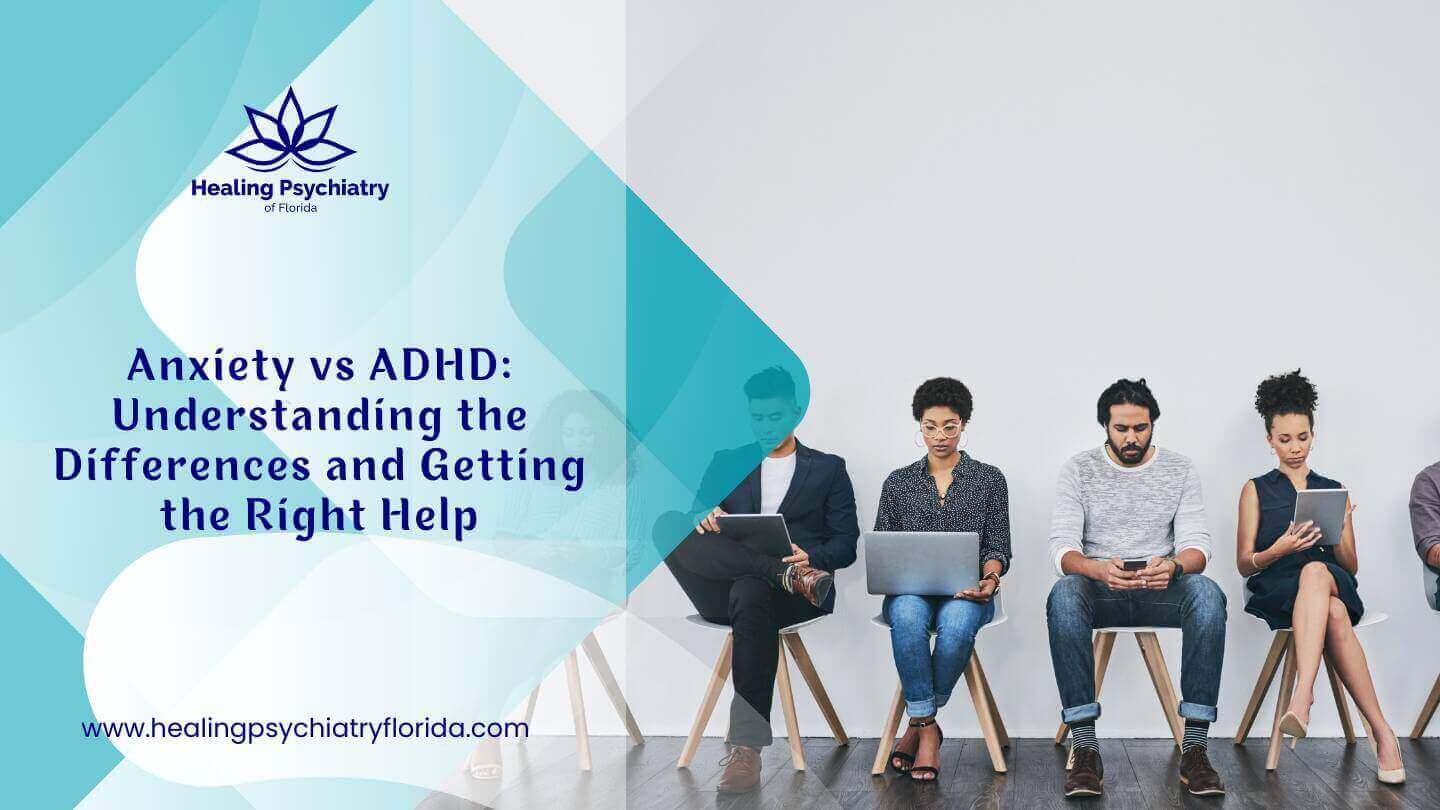Picture someone constantly fighting a storm of concerns. They might ask themselves, “Is this anxiety or ADHD?” This confusion is more common than you might think. According to the Anxiety and Depression Association of America (ADAA), 18.1% of adults in the U.S. suffer from an anxiety disorder every year, while the Centers for Disease Control and Prevention (CDC) reports that 9.4% of children have been diagnosed with ADHD.
The symptoms of anxiety and ADHD are so similar that it’s hard to pinpoint which one is causing the trouble. Many people suffer from constant worries. They struggle to concentrate and organize. They are unsure of the cause of their problems. This lack of clarity is quite frustrating. Without a clear understanding and treatment, managing either condition is tough.
Dealing with anxiety or ADHD, or even both, influences your everyday experiences, touching on everything from your relationships to how you perform at work. Many feel alone or misunderstood. Their symptoms aren’t always visible to others. This guide is here to help clarify the differences between anxiety and ADHD. By understanding the unique and shared traits of these conditions, you’re able to find the right support and treatment for your needs. We hope to provide useful tips for managing anxiety and ADHD. Our goal is to help you live a more balanced and satisfying life.
Understanding Anxiety
Anxiety is when you feel extremely worried and scared about everyday things for a long time or very frequently. Common symptoms include restlessness, a fast heartbeat, and sweating. Some also have trouble concentrating. The DSM-5, a guide used by doctors, lists different types of anxiety disorders, such as generalized anxiety disorder (GAD), panic disorder, and social anxiety disorder.
“Living with anxiety felt like waiting for a storm that never came,” says a patient. Persistent worries had a big impact on her daily life. Anxiety disorders are the most common mental health problems in the United States. Over 40 million adults in the U.S., or 19.1%, have an anxiety disorder.
Understanding ADHD
Attention Deficit Hyperactivity Disorder (ADHD) includes symptoms like inattention, hyperactivity, and impulsivity. These symptoms often show up as hyperactivity in children. They may fidget or have trouble sitting still. In adults, ADHD symptoms usually show up as problems with organization and managing time effectively.
“I felt like I was constantly moving from one thought to another without finishing anything,” recalls a patient describing life with undiagnosed ADHD. Approximately 4.4% of adults in the U.S. have ADHD. Unfortunately, many remain undiagnosed. Healing Psychiatry of Florida offers ADHD tests and treatments. They include behavioral therapy and counseling services.
Key Differences Between Anxiety and ADHD
Anxiety and ADHD often have overlapping symptoms. But they are different conditions, each with unique traits. Here’s a comparison to help illustrate these differences:

Anxiety:
- Excessive Worry: People with anxiety often worry excessively about many things, from work to personal relationships.
- Physical Symptoms: Common physical symptoms include a racing heart, sweating, trembling, and shortness of breath.
- Sleep Disturbances: Anxiety causes worries that make it hard to fall or stay asleep.
- Concentration Issues: Anxiety distracts the mind with fears, so it’s hard to focus.
- Avoidance Behavior: Individuals avoid social situations or activities that trigger their anxiety.

ADHD:
- Inattention: People with ADHD have trouble paying attention. They get easily distracted and can’t focus on tasks.
- Hyperactivity: This includes excessive fidgeting, restlessness, and difficulty sitting still. This is more noticeable in children.
- Impulsivity: Acting without thinking and interrupting others. Also, making rash decisions is a common impulsive behavior.
- Task Completion: People with ADHD often start many tasks but struggle to finish them. Or have trouble with task initiation. They frequently jump from one activity to another.
- Time Management Issues: Adults with ADHD have difficulties organizing tasks and managing their time. A condition known as time blindness.
Example Comparison:
- Anxiety: Imagine someone who constantly worries about upcoming events, such as a work presentation or a social event. This worry keeps them up at night, making it hard to concentrate during the day. They’ll avoid certain situations altogether to prevent feelings of anxiety.
- ADHD: Now, consider another individual who has trouble completing tasks at work. They start a project but quickly get distracted by other tasks or thoughts, leaving many projects unfinished. They forget deadlines or lose important items. This shows their poor organization and time management.
It is important to know the differences between anxiety and ADHD. This is the first step to finding the right treatment and support. If you or someone you know is experiencing these symptoms, it’s essential to seek professional help. An accurate diagnosis and a personalized treatment plan can make all the difference.
Studies show that up to 40% of children and 50% of adults with ADHD also have an anxiety disorder, highlighting the complexity of diagnosis.
At Healing Psychiatry of Florida, we are dedicated to helping you with anxiety and ADHD. We provide expert care and personalized treatment plans. Don’t let these conditions hold you back from living your best life. Contact us today to schedule a consultation and take the first step towards better mental health and a brighter future. Reach out now, and let us support you on your journey to well-being.
Similarities Between Anxiety and ADHD
Anxiety and ADHD may be different from each other, but they do share symptoms that make it tricky to identify which one is present. Here are some of the similarities:
- Restlessness:
- Anxiety: People with anxiety often feel a constant sense of unease or restlessness, as if they can’t relax or settle down.
- ADHD: People with ADHD are often restless. They fidget, tap, or can’t sit still.
- Difficulty Concentrating:
- ADHD: People with ADHD have trouble focusing. They get easily distracted by outside stimuli and their own thoughts.
- Anxiety: Concentration issues in anxiety come from persistent worries that distract the mind from the task at hand.
- Impaired Sleep:
- Anxiety: Anxiety leads to difficulty falling asleep or staying asleep due to ongoing worries.
- ADHD: Sleep issues in ADHD may result from hyperactivity and an inability to wind down at night.
- Emotional Dysregulation:
- Anxiety: People with anxiety may have strong emotional reactions. These are triggered by their fears or worries.
- ADHD: Those with ADHD often have emotional outbursts. They struggle to manage their emotions, especially when frustrated or overstimulated.
It’s important to know the differences between these two conditions. Their treatments are not the same. A misdiagnosis could result in ineffective care and further complications. For example, using anxiety meds to treat ADHD, or vice versa, might not address the root causes.
When individuals and healthcare providers understand the similarities and differences between anxiety and ADHD, they can work together. This leads to a more accurate diagnosis and a better treatment plan. This teamwork helps to meet each person’s needs. It improves symptoms and overall well-being.

Diagnosis and Assessment
Anxiety is diagnosed by comparing symptoms to criteria like the DSM-5. ADHD is diagnosed through clinical interviews, behavioral assessments, and sometimes neuropsychological tests. Accurate diagnosis is the cornerstone of effective treatment. It requires a thorough evaluation by a trained professional.
Treatment Options
For Anxiety
Cognitive-Behavioral Therapy (CBT): CBT helps people identify and challenge negative thoughts that fuel their anxiety. By learning to replace these thoughts with more realistic and less distressing ones. Patients reduce their anxiety levels.
- For example, a person with social anxiety might learn to reframe their fear of being judged by others by practicing positive self-talk. They also gradually expose themselves to social situations in a controlled, supportive environment.
Lifestyle Changes: Regular exercise and mindfulness practices play an important role in managing anxiety. Exercise helps reduce stress hormones and increase endorphins, which improve mood. Mindfulness practices, like meditation, help people stay focused and avoid overthinking anxious thoughts.
- For instance, mindfulness will make someone more relaxed. They will be less reactive to daily stress.
Medications (SSRIs): Selective Serotonin Reuptake Inhibitors (SSRIs) are commonly prescribed to help manage anxiety symptoms. These medications work by increasing levels of serotonin in the brain, which improves mood and reduces anxiety. Helping them to focus better at work and enjoy social interactions without overwhelming fear. Medication is a last resort if other holistic approaches are not working well enough.
For ADHD
Behavioral Therapy: Behavioral therapy for ADHD focuses on changing negative behaviors and forming positive habits. This includes setting up routines, using rewards to encourage good behavior, and finding ways to get more organized.
- For example, a child with ADHD might use a reward system to complete their homework on time. It would help them focus and finish tasks. Similarly, an adult with ADHD can benefit from using a planner to track daily tasks and appointments. A small treat for finishing their to-do list can boost their focus and time management.
Coaching: ADHD coaching involves working with a coach to design strategies for managing daily tasks and long-term goals. This includes time management techniques, organizational skills, and planning strategies.
- For instance, someone might learn to use a planner, set reminders for tasks, and break big projects into small steps. This coaching helps them stay on track and feel more in control of their life.
Lifestyle Adjustments: Holistic methods help ADHD. A balanced diet, regular exercise, and enough sleep improve symptoms. Techniques like mindfulness and meditation also help in boosting focus and reducing impulsivity.
Medications: Stimulant medications like methylphenidate and amphetamines are often prescribed to manage ADHD symptoms. They work by boosting certain brain neurotransmitters. This increases attention and reduces impulsivity and hyperactivity. Non-stimulant medications, such as atomoxetine, are also effective and may have fewer side effects. Like anxiety treatment, ADHD meds are sometimes needed when holistic methods aren’t enough.

Living with Anxiety and ADHD
Managing anxiety and ADHD feels like an uphill battle, but with the right strategies and support, you will lead a fulfilling life. Imagine waking up each day feeling more in control, less overwhelmed, and ready to tackle whatever comes your way. The journey to better mental health involves small, practical steps that can make a big difference.
For Anxiety
- Mindfulness Practices: Add mindfulness exercises, like meditation or deep breathing, to your daily routine. These practices help you stay grounded and lessen overthinking. Spending just 10 minutes a day on mindful breathing will lower anxiety levels.
- Exercise: Regular physical activity is a powerful tool against anxiety. Exercise releases endorphins, which are natural mood lifters. Even a brisk 30-minute walk helps ease anxiety symptoms.
- Balanced Diet: Eating a balanced diet rich in fruits, vegetables, and whole grains affects your mental health. Avoiding excessive caffeine and sugar also helps stabilize your mood.
For ADHD
- Planners and Reminders: Using planners or digital calendars will help organize your day. Setting reminders for tasks makes sure important activities are not forgotten. It provides structure and reduces the chaos of ADHD.
- Breaking Tasks into Smaller Steps: Large tasks are overwhelming. But breaking them into smaller steps makes them more achievable. For instance, instead of “cleaning the house,” break it down into “vacuuming the living room” and “dusting the shelves.
- Encouragement: Managing anxiety and ADHD is a journey. It involves finding the right mix of strategies that work for you. Seeking support from professionals, whether through therapy, coaching, or support groups, is important. With persistence and the right approach, you will manage your symptoms and lead a productive, fulfilling life.
Using both holistic methods and practical tools boosts your daily life and well-being. Holistic methods include mindfulness and exercise. Practical tools include planners and task managers.
Get Professional Help
For those needing more help, Healing Psychiatry of Florida offers services to manage anxiety and ADHD. Our experts create personalized treatment plans to meet your needs. They include therapy, coaching, and holistic methods. Contact us today to start your journey toward better mental health and a more balanced life.
Take the first step toward managing your anxiety and ADHD by reaching out to Healing Psychiatry of Florida. Schedule a consultation today and begin your path to a fulfilling life.
Conclusion
Anxiety and ADHD share some symptoms. But they are unique. They need accurate diagnosis and individual treatment plans. Recognizing the signs and seeking professional help is the first step towards a brighter, more manageable future.
At Healing Psychiatry of Florida, we are dedicated to providing the expert care and support you need to manage these challenges. With the right strategies and guidance, you can manage anxiety and ADHD. It’s a journey toward a more balanced, fulfilling life.
If you or a loved one experiences these symptoms, don’t hesitate to reach out. Our team is here to help you every step of the way, making sure you receive the tailored treatment and support necessary for your well-being. Embrace the hope and opportunity for positive change—contact us today to start your journey toward better mental health.
For more information or to schedule a consultation, contact us at +13219729215 or visit our website.

